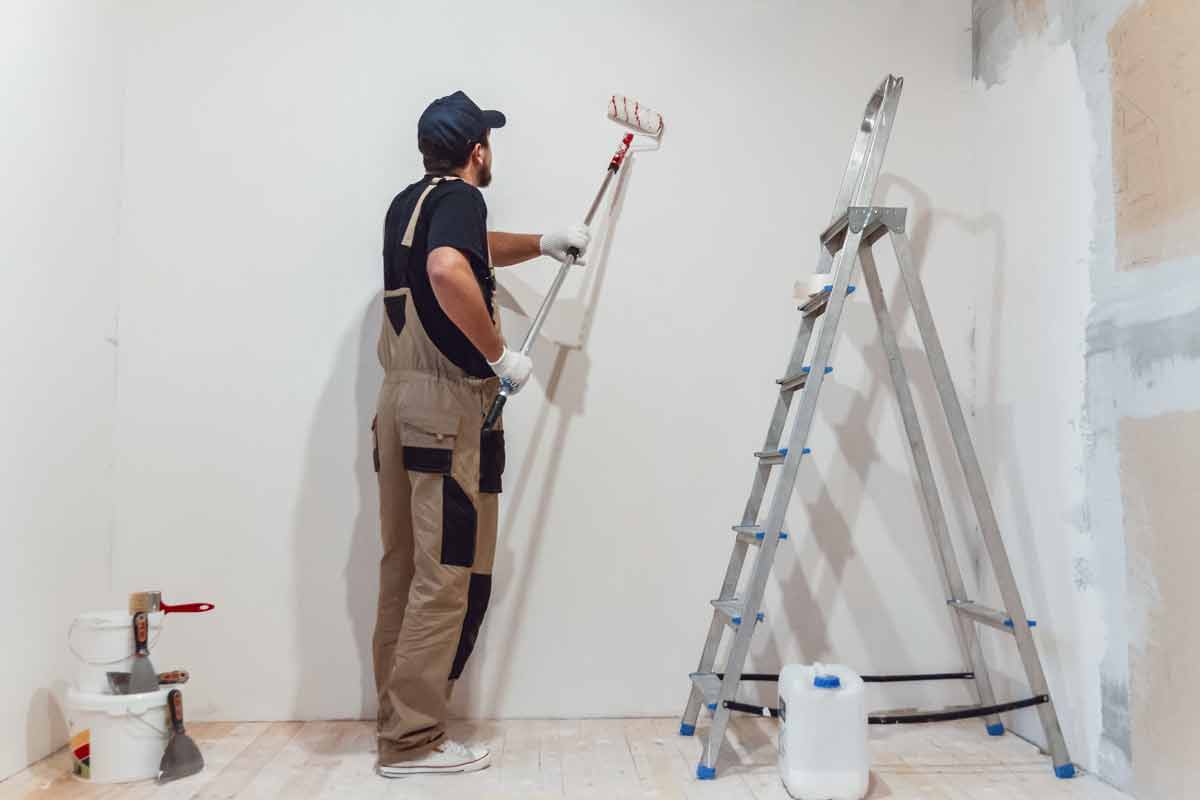Menu

Key Takeaways✔ Hiring a licensed, trained painter ensures long-lasting, high-quality results. ✔ Painter certification and licensing protect homeowners from costly mistakes. ✔ Apprenticeships for painters build real-world skills that show in the final finish. ✔ Knowing the skills needed to be a painter helps identify true professionals. ✔ Clear estimates reveal a painter’s experience, honesty, and project knowledge. ✔ Experience and training directly impact how smoothly and quickly a project runs. ✔ Painters who meet all painting contractor requirements bring both safety and value. |
A fresh coat of paint can completely transform a home, but the difference between a flawless finish and a frustrating mess often comes down to who’s holding the brush. In Trumbull, CT, homeowners looking for lasting results turn to professionals who bring skill, training, and certification to the job. Choosing the right painter means understanding what qualifications matter, how pros get trained, and what to expect from a contractor who truly knows the craft.
Here are five essential steps to getting professional home painting in Trumbull, CT.
Professional painters do more than roll color on walls—they understand surfaces, prepare properly, and follow safety and quality standards. Before hiring anyone, it helps to know what sets a trained painter apart from a casual one. Learning how to become a professional painter can also offer insight into the standards true professionals must meet.
Trustworthy painters follow more than just a good paint line—they follow rules that protect both people and property. In Connecticut, certified and licensed painters meet safety standards and carry the right insurance. Knowing the basics of painter certification and licensing helps make hiring decisions more secure.
Credentials look good on paper, but experience brings those lessons to life. Painters who have completed apprenticeships or worked on diverse projects often bring sharper skills and better results. That real-world training builds both confidence and craft.
Hiring a professional isn’t just about showing up with brushes and drop cloths. The process involves planning, protection, and performance standards. Understanding what painting contractor requirements include can help spot red flags early.
In a crowded market, the right painter stands out by consistently delivering professional results that meet or exceed industry expectations. A little research can go a long way in narrowing down reliable options. Look for signs of both technical skill and commitment to ethical service.
Choosing a painter with hands-on experience is often the difference between a clean, lasting finish and a job that needs redoing in six months. One of the clearest signs of professional training is whether a painter has completed a formal apprenticeship. While it may seem like an industry term, apprenticeships for painters can directly impact the quality, safety, and durability of the work done in any Trumbull home.
Before becoming licensed or certified, many painters start their careers in apprenticeship programs. These programs combine classroom instruction with fieldwork under experienced painters, helping trainees build core competencies like surface prep, taping, brushing, spraying, and cleanup. For homeowners, this means hiring someone who has practiced the skills needed to be a painter in real-world conditions—not just read about them.
A good apprenticeship includes lessons on reading blueprints, understanding paint formulas, using scaffolding, and complying with local safety codes. These are all vital parts of painting contractor requirements that casual workers may not follow. Painters who’ve gone through apprenticeships know how to meet industry standards while keeping homes and families safe during the job.
In Connecticut, how to become a professional painter often begins with an apprenticeship before moving into formal certification. Completing an apprenticeship is frequently a required step in meeting state-level painter certification and licensing rules. When a homeowner hires someone who has gone through this process, they’re working with a person who’s invested time in learning their craft the right way.
Apprenticeship programs aren’t quick—they can last two to four years and require consistent performance, attendance, and growth. This helps weed out people who aren’t serious about painting as a profession. When a homeowner chooses a painter who’s been through this process, they’re more likely to get someone who values commitment, accountability, and reliability on the job.
Many apprenticeships for painters in Connecticut are sponsored by local unions or painting companies that follow regional safety and quality codes. That means painters are trained with the exact expectations homeowners in Trumbull expect—from New England weather challenges to common home construction materials. Painters trained locally are more likely to understand what makes a paint job last in this specific area.
For someone looking at how to become a professional painter, apprenticeships are a defining stage. Painters who complete them show a willingness to learn, improve, and meet all relevant painting contractor requirements. To a homeowner, that translates to trust—because they’re hiring someone who took the long road to become excellent at what they do.
Interior painting was the most popular home improvement project in the United States in 2020, with roughly 35% of consumers repainting their indoor walls. With so many homeowners investing in fresh interiors, knowing how to read a professional painting estimate becomes even more important. For those in Trumbull, understanding this breakdown helps ensure the contractor meets local painting contractor requirements.
The estimate should spell out exactly what’s being painted—walls, ceilings, trim, siding, decks, or more. This includes whether repairs, priming, or special finishes are needed. A painter who has gone through apprenticeships for painters or formal training will provide precise scopes that reflect thoughtful project planning.
Surface prep is one of the most important factors in a long-lasting paint job. The estimate should detail whether surfaces will be cleaned, sanded, caulked, or primed. These prep steps reflect both the skills needed to be a painter and the painter’s commitment to doing the job right the first time.
A trustworthy contractor lists paint brands, number of coats, primer types, and finishes in writing. Vague descriptions like “premium paint” without naming the product are red flags. Painters with painter certification and licensing understand the importance of product compatibility and durability.
An estimate should include the expected start and finish dates along with working hours. Weather delays and drying times should also be addressed to manage expectations. Painters who know how to become a professional painter plan ahead, set realistic timelines, and communicate clearly throughout the project.
A professional estimate breaks down labor, materials, travel, and other charges—not just a lump sum. This kind of transparency is one of the clearest indicators that a painter understands painting contractor requirements and values trust. Hidden fees or incomplete pricing are signs to walk away.
The estimate should confirm that the contractor holds proper insurance and complies with local and state regulations. Painters with valid painter certification and licensing will include this up front—no prompting needed. Homeowners deserve the peace of mind that comes with working with someone who took the right steps in how to become a professional painter.
 How Experience and Training Affect Project Timelines
How Experience and Training Affect Project TimelinesThe global house painting services market is expected to rise at an annual rate of 5.2% from 2023 to 2033, reflecting growing demand for reliable, high-quality results. With more homeowners investing in professional services, hiring a painter isn’t just about achieving a better finish—it’s also about completing the job efficiently.
From prep work to final touch-ups, the right background keeps projects on track while meeting both quality standards and homeowner expectations.
Painters who understand the correct order of operations—cleaning, sanding, priming—can move quickly and confidently through each phase. This efficiency comes from years of experience and often from completing apprenticeships for painters that focus on proper prep techniques. Time saved on setup translates to faster project completion without sacrificing quality.
Not every surface is predictable, and weather can throw off even the best schedules. Painters who’ve learned how to become a professional painter are better prepared to adjust timelines if they encounter water damage, old wallpaper, or temperature-sensitive materials. Their training helps them pivot quickly and keep delays minimal.
In structured apprenticeships for painters, professionals learn how to pace a job day-by-day—what gets done in what order, and how long each step should take. That pacing becomes second nature over time, reducing mistakes and avoiding time-wasting do-overs. It’s one of the many ways formal training contributes to staying on schedule.
Painters with painter certification and licensing are trained in product-specific timing, including drying, recoat windows, and curing processes. Rushing these steps can cause cracking, peeling, or uneven coverage. Professionals know how to balance speed with product requirements to avoid callbacks and ensure lasting results.
Painters with the skills needed to be a painter understand how to keep a worksite organized and productive. They avoid overcommitting, clean as they go, and reduce downtime between stages of the project. For homeowners, this means less disruption, fewer schedule changes, and a smoother overall experience.
Those who meet painting contractor requirements know that reputation depends on delivering what was agreed upon—on time and within scope. Their training includes setting honest expectations and meeting them, which builds trust. Homeowners benefit from a predictable timeline and a project that wraps up as planned.
Some painting contractors allow clients to provide paint, but many prefer using products they trust and are trained to apply. This helps avoid issues with finish quality, compatibility, or warranty coverage. Professionals who meet painting contractor requirements typically have product experience and recommendations based on performance, not just color.
Yes, many experienced painters offer basic color consultation or work alongside designers to help choose the right finish. Their training often includes understanding light reflection, surface textures, and undertones. Painters who’ve completed apprenticeships for painters may have more exposure to these topics through real-life projects.
Most trained painters are skilled in minor drywall repairs like patching holes, smoothing seams, or repairing water damage. These tasks are considered part of the skills needed to be a painter and ensure better adhesion and smoother finishes. However, major structural damage should be handled by a licensed contractor first.
e handled by a licensed contractor first.
Skilled painters are often booked weeks or months in advance, especially during peak seasons like spring and summer. Planning ahead allows more time to review credentials, finalize scope, and align with a realistic schedule. Painters who hold painter certification and licensing usually maintain busy calendars due to higher demand.
Residential painting focuses on homes, often with more detail-oriented work like trim, cabinetry, and color coordination. Commercial painting covers larger spaces, different materials, and may require different equipment or safety clearances. Those looking into how to become a professional painter often train in both areas to widen their job opportunities.
When it comes to professional home painting in Trumbull, CT, Trumbull House Painter Pros delivers results that last. Backed by trained crews who meet all painting contractor requirements, our team handles everything from prep to final coat with skill, care, and precision. Whether it’s interior refreshes or full exterior transformations, we bring the painter certification and licensing that gives homeowners peace of mind.
Don’t settle for rushed or unlicensed work—trust a crew that values craftsmanship, timeline, and a job well done. Contact us today!